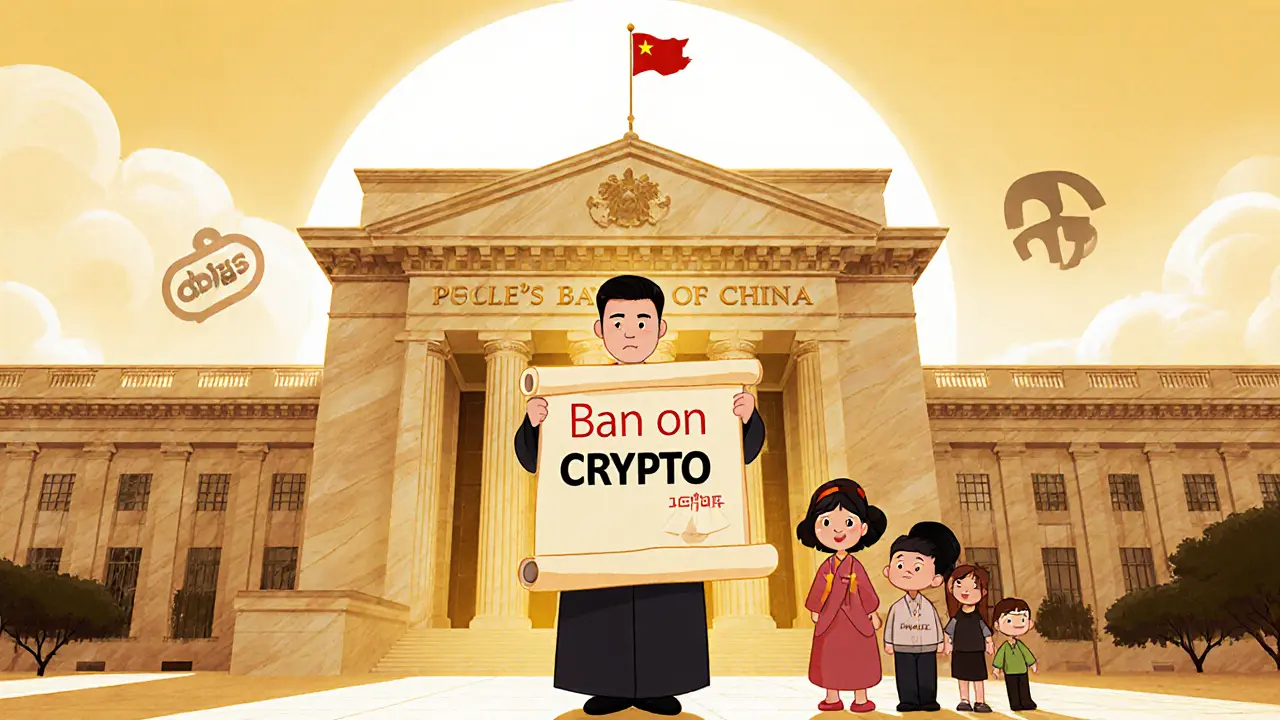Crypto Exchange Compliance Checker
From June12025 the People’s Bank of China (People's Bank of China the central bank that enforces China’s strict financial rules) has declared every form of cryptocurrency activity illegal for Chinese residents. The ban covers trading, mining, holding, and even accessing overseas platforms. In plain terms, any cryptocurrency exchange a service that lets users buy, sell, or trade digital assets is off‑limits, no matter where the server lives.
Key Takeaways
- All crypto exchanges - Binance, Coinbase, Huobi, OKX, and others - are prohibited for Chinese citizens.
- The June2025 decree carries criminal penalties, asset seizure, and heavy fines.
- State‑approved alternatives include the digital yuan, Alipay, and WeChat Pay.
- Compliance monitoring involves both online tracking and offline inspections by the Ministry of Public Security.
- Relocating to a permissive jurisdiction is the only legal way to trade crypto.
Why the Ban Is Absolute
The 2025 prohibition is the culmination of a 16‑year tightening process. Early warnings began in 2009, followed by bans on banking services (2013), exchange closures (2014), ICO bans (2017), miner crackdowns (2018‑2021), and finally the comprehensive decree that removes every loophole. The central goal is to eliminate any private digital currency that could challenge the state’s monetary sovereignty.
Two regulatory pillars drive the ban:
- Financial stability: Authorities argue that uncontrolled crypto markets threaten capital flows and consumer protection.
- Political control: Decentralised tokens bypass the state’s ability to monitor transactions, which clashes with the government's surveillance framework.
Who Enforces the Rules?
The enforcement network is led by the Ministry of Public Security China’s chief law‑enforcement agency overseeing cybercrime and financial crimes. It works alongside the People's Bank of China and the China Banking and Insurance Regulatory Commission (CBIRC). Their joint task force monitors internet traffic, inspects banks, and conducts surprise raids on businesses that facilitate crypto transactions.
Violation consequences are severe:
- Immediate asset seizure of any crypto holdings.
- Criminal charges that can lead to imprisonment of up to seven years.
- Fines ranging from 100,000CNY to millions, depending on the scale.

Which Exchanges Are Off‑Limits?
Every major platform, regardless of its country of origin, falls under the ban. Below is a snapshot of the most well‑known services and their legal status for Chinese residents.
| Exchange | Headquarters | Legal Status in China |
|---|---|---|
| Binance | Malta | Prohibited |
| Coinbase | USA | Prohibited |
| Huobi | Singapore | Prohibited (despite Chinese roots) |
| OKX | HongKong | Prohibited |
| Kraken | USA | Prohibited |
| KuCoin | Seychelles | Prohibited |
| Gate.io | Cayman Islands | Prohibited |
| Decentralised Exchanges (Uniswap, PancakeSwap, etc.) | Various | Prohibited - access blocked and punishable |
The ban also applies to peer‑to‑peer (P2P) platforms, over‑the‑counter (OTC) desks, and any mobile apps that facilitate crypto trades. Even API access for developers is outlawed.
What Legal Alternatives Exist?
China’s answer to private crypto is the digital yuan the state‑issued Central Bank Digital Currency (CBDC). Managed by the People’s Bank of China, the digital yuan offers fast, traceable payments while keeping full control over monetary policy.
Other sanctioned digital services include:
- Alipay - the dominant mobile payment platform linked to verified bank accounts.
- WeChat Pay - integrated into the ubiquitous WeChat messaging app.
- Government‑approved wealth‑management products that invest in traditional assets like stocks or bonds.
These channels comply with KYC and AML rules that focus on preventing any crypto‑related activity.
How to Stay Compliant If You’re Currently Holding Crypto
For Chinese residents who already own digital assets, the safest path is to:
- Cease any trading or transfer activity immediately.
- Consider moving the assets to a non‑Chinese jurisdiction where you have legal residency or citizenship.
- Consult a qualified cross‑border legal advisor to understand tax and reporting obligations.
- Avoid using VPNs or other obfuscation tools that could attract law‑enforcement attention.
Attempting to hide crypto holdings can trigger the Ministry of Public Security’s AML monitoring system, which scans transaction patterns for any links to virtual currencies.

Global Implications of China’s Crypto Ban
China’s market size-over a billion potential users-means the ban reshapes global liquidity. When Chinese investors are blocked, worldwide exchange volumes drop, and price volatility can increase because a large source of demand disappears. Analysts note that any future policy reversal would likely cause a massive influx of capital, driving sharp price spikes.
Meanwhile, Chinese tech firms continue to explore blockchain for supply‑chain and identity use cases, but always under strict state oversight. The line between permissible blockchain and prohibited crypto remains tightly drawn.
Frequently Asked Questions
Can I use a VPN to access banned exchanges?
While a VPN might hide your IP, Chinese authorities monitor VPN traffic and can still trace transaction signatures. Using a VPN to trade crypto is considered illegal and can lead to fines or criminal charges.
What happens if I’m caught holding Bitcoin?
The state can seize the assets, impose a monetary penalty, and prosecute the holder. Penalties scale with the amount held and whether the holder attempted to transfer or trade the coins.
Is the digital yuan a crypto?
No. The digital yuan is a Central Bank Digital Currency, fully backed by the state and subject to the same regulations as traditional fiat.
Can I invest in crypto through offshore accounts?
Only if you have legal tax residency outside China and fully comply with the laws of that jurisdiction. Doing so from within China still breaches Chinese law.
What are the penalties for operating a crypto exchange serving Chinese users?
Operating such a service can lead to corporate fines of up to 10millionCNY, the revocation of business licenses, and imprisonment of executives for up to seven years.
Next Steps for Residents
If you’re living in China and want to stay on the right side of the law, follow this quick checklist:
- Stop using any crypto exchange or wallet app immediately.
- Switch all digital payments to Alipay, WeChat Pay, or the digital yuan.
- If you hold crypto, consult a qualified attorney about moving assets abroad.
- Keep an eye on official announcements from the People’s Bank of China for any policy updates.
Sticking to state‑approved channels protects you from severe legal risk and aligns with China’s long‑term financial strategy.
crypto exchanges China remain off‑limits for anyone subject to Chinese jurisdiction, and compliance is enforced with a rigor that leaves little room for error.


Melanie LeBlanc
The guide does a solid job laying out the landscape.
It’s helpful to see the exchanges listed with clear status.
Also, the checklist at the end gives a practical next step.
Remember to stay aware of any policy updates.
Don Price
It’s easy to think that the Chinese ban is just another bureaucratic footnote, but the reality is far grimmer than most people realize.
The state’s surveillance apparatus has been quietly integrating with global crypto data feeds for years, waiting for the perfect moment to strike.
When the June 2025 decree finally dropped, it wasn’t a random act of legal housekeeping; it was the culmination of a covert operation to eliminate any financial autonomy that could challenge the Party’s narrative.
Every prohibited exchange listed in the article represents a node that the government has been systematically dismantling through pressure on foreign regulators, covert cyber‑operations, and targeted raids on local intermediaries.
Even the so‑called “decentralized” platforms are not immune, because the authorities have deployed advanced network‑level blocking that can detect and quarantine DApp traffic in real time.
What many fail to see is that the ban also serves a dual purpose: it funnels domestic capital into the state‑issued digital yuan, bolstering the government’s monetary control while starving private innovators of liquidity.
In parallel, the crackdown sends a chilling message to any fintech startup that might entertain the idea of integrating crypto services, effectively stifling an entire generation of blockchain talent.
Meanwhile, overseas exchanges are feeling the pressure to over‑comply, adding onerous KYC demands for any user whose IP appears to originate from the Great Firewall, even if the user is merely using a VPN for unrelated reasons.
The legal risk for ordinary citizens is not just a theoretical fine; asset seizure teams have been granted sweeping powers to freeze wallets, and criminal statutes now carry prison terms up to seven years for “willful violation.”
For those who think a VPN can shield them, remember that the government’s deep‑packet inspection capabilities can flag encrypted traffic patterns associated with known exchange APIs.
Moreover, the Ministry of Public Security has instituted a bounty program for reporting illicit crypto activity, incentivizing citizens to surveil each other.
All of this creates a feedback loop where fear and compliance reinforce each other, making the ban self‑sustaining.
In short, the 2025 prohibition is less about protecting investors and more about consolidating power, and the ripple effects will be felt in every corner of the global crypto ecosystem.
The international community has taken note, issuing advisory warnings to its own citizens traveling to China.
Anyone who ignores these dynamics does so at their own peril.
Mark Fewster
I see the facts laid out clearly, with no fluff, and the risks are obvious, thank you for the concise summary.
It’s helpful to have the list of prohibited exchanges in one place.
Dawn van der Helm
Wow, this is a thorough rundown! 😃
Staying compliant just got a lot simpler.
Monafo Janssen
The article breaks down the legal situation in plain language.
It’s good to see the table that shows each exchange’s status.
Anyone reading this should double‑check the latest government notices.
Michael Phillips
From a philosophical standpoint, the state's desire for monetary sovereignty raises questions about individual freedom.
Balancing collective stability and personal autonomy is a classic dilemma.
Jason Duke
Great job on summarizing the crackdown, and kudos for listing the exchanges clearly!;
People need to understand the seriousness, otherwise they'll get burned;.
Stay vigilant and share this info widely!
Franceska Willis
i cant believe they cant even let ppl check these sites lol.
EDWARD SAKTI PUTRA
Melanie’s points are spot‑on; staying aware of policy updates is essential, especially given how quickly regulations can shift.
Bryan Alexander
Don’s deep‑dive really captures the gravity of the situation.
The way you laid out the surveillance network reads like a thriller, and it underscores how dangerous the landscape has become.
It’s a reminder that even casual traders can become targets if they aren’t careful.
Thanks for shedding light on the hidden layers of control.
Patrick Gullion
While Mark’s summary is neat, I think the real issue is that many users still think a VPN is a magic shield, which isn’t the case.
People underestimate how thorough the state’s monitoring really is.
Jack Stiles
Dawn, i felt the same excitement, but gotta stay chill – the ban’s real and we cant ignore it.
Ritu Srivastava
The guide is helpful, yet it glosses over the moral imperative of obeying the law.
Disregarding these regulations isn’t just risky, it’s irresponsible and undermines national stability.
Liam Wells
Michael’s philosophical observation is commendable; however, the primacy of state‑mandated monetary policy cannot be overstated.
The jurisprudential framework established post‑2025 leaves little room for dissent, thereby reinforcing sovereign control.
Consequently, any discourse on individual autonomy must be contextualized within this statutory environment.
One must therefore align personal views with the prevailing legal order.
Darren Belisle
Jason’s call to share information is vital; spreading awareness helps protect the community.
Let’s keep the dialogue constructive and ensure everyone stays informed.
Collective vigilance benefits all.
Caitlin Eliason
Franceska, such a flippant tone ignores the severe repercussions that many have faced. 😠
The reality is that non‑compliance can lead to asset seizure and imprisonment. 🚨
Take the warnings seriously.
Richard Bocchinfuso
yeah edward, it's realy important to stay on top of the law, cant be slack.
Mark Bosky
Mr. Bryan, your articulation of the surveillance mechanisms adds considerable depth to the discourse.
Your exposition elucidates the perils inherent in ignoring state mandates.
I concur that heightened vigilance is imperative.
Debra Sears
Patrick raises a good point about VPN misconceptions.
Could we explore which specific VPN protocols are most detectable by Chinese authorities?
Andrew Lin
Jack, your chill attitude is naive – this is about protecting our nation’s economic sovereignty!
If you ignore the crackdown, you’re effectively aiding foreign exploiters.
We must enforce the ban without hesitation.
Matthew Laird
Ritu’s moral stance is spot on; anyone who flouts the law is betraying our country.
We need to call out the dissenters loudly.